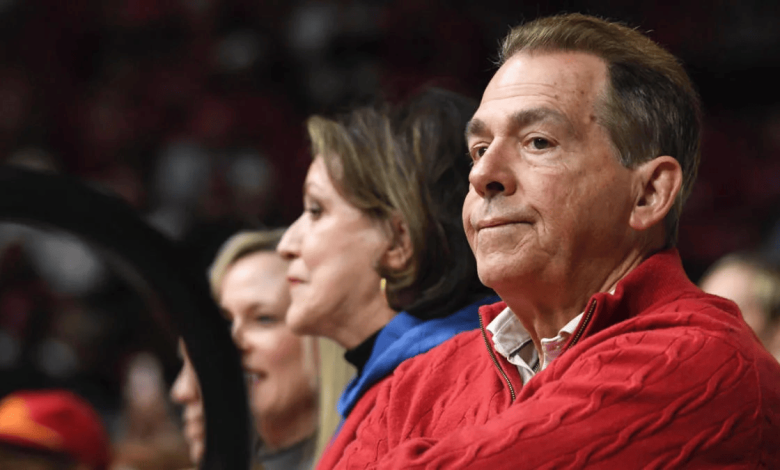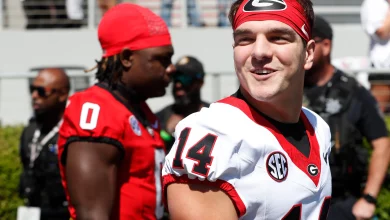How Nick Saban transformed from Alabama’s Darth Vader to ESPN’s favorite uncle in college football

Many people consider Alabama Crimson Tide head coach Nick Saban to be among the best college football coaches of all time. He has won multiple titles and honors because of his unwavering dedication to perfection, intense competitiveness, and reputation as a maestro on the football field. On the other hand, his public image has changed dramatically. Saban has changed from being viewed by many as the “Darth Vader” of college football in his early years at Alabama—stoic, frightening, and seemingly emotionless—to becoming far more personable, relatable, and even charming. He has grown to be ESPN’s favorite college football uncle over the years, adored for his knowledge and charm off the field in addition to his coaching prowess.
The Darth Vader Persona: Early Years at Alabama
When Nick Saban first arrived at Alabama in 2007, the program was coming off a period of instability. The Crimson Tide had suffered through a series of disappointing seasons, and Alabama was desperate for a leader to restore its once-proud football legacy. Saban, fresh off a successful stint at LSU where he had led the Tigers to a national championship, was seen as the perfect man to turn Alabama’s fortunes around.
From the very beginning, Saban’s no-nonsense approach to coaching quickly established him as a stern, demanding figure. His focus on discipline, perfection, and a relentless work ethic became the defining traits of his program. He was laser-focused on building a powerhouse, and this mentality came with an unmistakable intensity. In the early days of his tenure, Saban was widely viewed as the “bad guy” of college football—his fiery sideline demeanor and frequent media confrontations only solidified this image.
In a highly publicized incident in 2008, Saban’s terse, often combative interactions with the media drew widespread criticism. His repeated insistence on maintaining control over every aspect of the program, coupled with his refusal to show emotion or vulnerability, painted him as the football equivalent of Darth Vader. He seemed to embody a sense of unyielding authority and invincibility, creating a persona that was almost intimidating to both players and outsiders alike.
The Alabama Dynasty Takes Shape
Despite this “Darth Vader” reputation, Saban’s methods began to bear fruit. Under his leadership, Alabama experienced a remarkable resurgence, culminating in a national championship in 2009. Saban’s attention to detail, tactical brilliance, and emphasis on discipline turned the Crimson Tide into a juggernaut, dominating college football for over a decade. Alabama’s success on the field was a testament to Saban’s commitment to perfection and his singular focus on winning.
Yet, while Saban’s coaching brilliance was undeniable, it was also clear that his persona—at least publicly—remained that of a hard-nosed, unemotional figure. His focus on control, both on and off the field, kept him at arm’s length from the media and the public. He was not interested in public relations or fanfare; he was only interested in success.
The Shift Begins: Saban Finds His Voice
Over time, however, a subtle transformation began to take place. As Alabama continued to dominate college football, Saban started to reveal a more personable side. His interactions with players, media, and fans began to evolve, as he realized the importance of public perception and the need to connect with people beyond just winning games.
One of the key moments in this transformation came in 2014, when Saban made a public admission that he had grown as a coach and a person. In a candid interview, Saban acknowledged that, earlier in his career, he had been so focused on achieving success that he had neglected the emotional and relational aspects of coaching. He admitted that he had been too consumed by the pursuit of perfection and that he had sometimes alienated those around him in the process.
This self-awareness marked a pivotal shift in Saban’s persona. He became more willing to show emotion, to express humility, and to embrace the human side of coaching. His once-distant demeanor began to soften, and a more relatable version of Nick Saban began to emerge. His focus on developing players as people, not just athletes, became a core tenet of his coaching philosophy.
The Rise of the “Favorite Uncle”
As Saban’s public persona continued to evolve, he became more involved in media appearances, particularly with ESPN. No longer the stern, emotionless figure of his early years, Saban embraced opportunities to engage with fans and analysts in a more relaxed and open manner. His role as a frequent guest on ESPN’s “College GameDay” allowed him to show off his wry sense of humor, his charm, and his ability to engage with the public in a way that was previously unimaginable for a coach of his stature.
One of the most notable aspects of Saban’s transformation was his newfound ability to connect with younger generations. Despite being in his 60s, Saban became a relatable figure for college students, high school recruits, and fans alike. His reputation as a disciplinarian was balanced by his willingness to share stories, joke around, and express vulnerability in a way that made him feel more like a trusted mentor than a distant authority figure.
For many, Saban became the “favorite uncle” of college football—someone who could offer valuable advice, but also someone who had a sense of humor, was willing to laugh at himself, and had a genuine interest in the well-being of others. His interviews became more conversational, often peppered with anecdotes about life, family, and the importance of staying grounded. He wasn’t just a coach anymore; he was a figure who could offer wisdom about life beyond football.
The Personal Side of Nick Saban
As Saban became more comfortable with his role as a public figure, his personal life began to gain more attention. His relationship with his wife, Terry, became a central part of his narrative. The couple’s long-standing partnership became an emblem of stability and support, and Terry Saban, in particular, became an influential figure in her own right. Their philanthropic efforts, particularly in Alabama, only added to their public image as a grounded, family-oriented couple.
Saban’s work with the Nick’s Kids Foundation, which focuses on improving the lives of children and families in need, further cemented his image as a compassionate and caring individual. His off-the-field activities demonstrated that there was more to Nick Saban than just the steely-eyed coach on the sideline. He was a man with a heart, a leader who valued character, integrity, and giving back to the community.
In interviews, Saban began to discuss his perspective on life more openly. He spoke about the importance of balance, the role of faith, and his desire to positively impact the lives of young people. It was clear that, while football remained at the center of his world, he had grown into a more well-rounded individual who understood that success in life wasn’t just about wins and losses—it was about making a difference in the lives of others.









